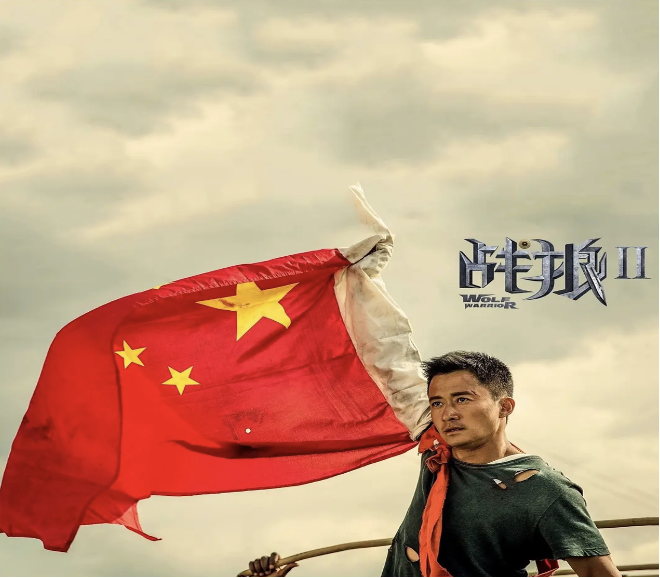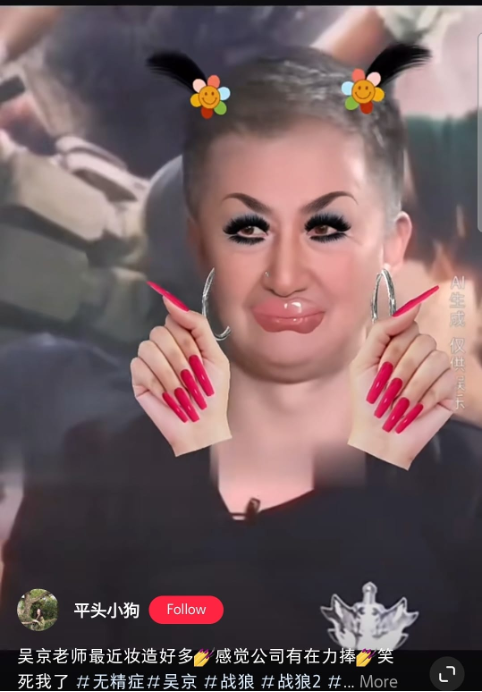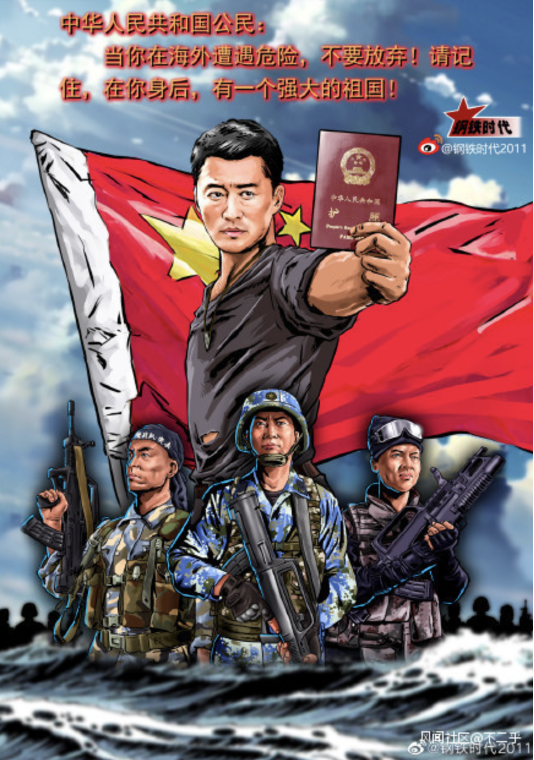
The Chinese film industry takes Wu Jing (吴京), the macho lead in some of the country’s biggest propaganda blockbusters, very seriously indeed. In the tub-thumping Battle at Lake Changjin series (co-produced by the Central Propaganda Department), he plays a commander leading his men to victory against the Americans in the Korean War, meeting his end in a fireball of patriotic glory. In the smash-hit Wolf Warrior franchise he is a gun-toting crack PLA marine, smashing his boot into the cheek of drug lords and rescuing Chinese citizens from a failed African state, treating the PRC flag as a protective talisman with his own arm as its pole.
In many ways, Wu is the face of the government’s ideal of a more assertive Chinese nation, one that is ready to stand tall in the world and fly its flag high — the same muscular nationalism on full display this week as state-of-the-art weaponry rolled through Beijing and soldiers goose-stepped to commemorate the 80th anniversary of World War II’s end. Not for nothing were the methods of a new generation of more pugnacious Chinese diplomats christened “Wolf Warrior Diplomacy.” A recurring quote from the film that spawned the label ran, “Whoever offends China will be punished, no matter how far away they are” (犯我中华者,虽远必诛). The line is well known across the country.

But last week, in the run-up to this week’s display of military might in Beijing, mocking videos of Wu that inexplicably went viral had state media pundits furiously scratching their heads. It was perhaps for some a jarring reminder that not everyone in China takes what Wu Jing represents as seriously as propagandists would like.
Ribbing the Wolf Warrior
Wu Jing’s career has wilted slightly since his glory days. Earlier this month, a film he produced was a box office flop, pulled from theaters after just six days. It’s a far cry from the wolf warrior heyday, which some pin as starting the same year as Wolf Warrior 2 in 2017. That film, and then The Battle at Lake Changjin, were the highest-grossing Chinese films of all time until very recently.
Shortly afterwards, a series of videos started going viral on Chinese streaming apps like RedNote and BiliBili. They riffed on a clip from an interview Wu gave for the state-run China Central Television (CCTV) during the release of Wolf Warrior 2. In it he talks about the difficulties of the filming process, waving his pen at the female interviewer as he solemnly imparts his knowledge. The dramatic pauses and head wiggles Wu puts between sentences have rich comic potential. Memes trivializing the exchange, or using AI to make Wu talk nonsense, went viral.

What to make of this wave of ridicule?
An op-ed reposted by the Shanghai based online outlet Guancha (观察) noted Wu’s unpopularity among Chinese women, who perceive him as “oily and chauvinistic.” Others, meanwhile, found it difficult to listen to Wu’s exaggerated ultra-manly, utterances without feeling a sense of embarrassment (“tanks don’t have rear-view mirrors”). Another commentator from commercial outlet Huxiu considered the actor arrogant in the interview — and suggested that his sense of self-importance and extreme confidence in his own talents had been undermined by the failure of his most recent film.
Others wondered what the aversions voiced online meant for the attitudes and values Wu has stood for. Former Global Times editor-in-chief and public commentator Hu Xijin (胡锡进) speculated that the mocking of Wu might be at least in part about young people venting their frustration with poor job prospects and extraordinary life pressures, which according to Hu had “partially weakened the passion of the ‘Wolf Warrior’ spirit.'” He hastened to add, however, that he feels the ethos of “patriotic heroism” (爱国英雄主义) the Wolf Warrior films have epitomized is not yet entirely outdated, and that such patriotic films should continue to find a market in the future.
Propaganda officials would likely not be encouraged by such a lackluster affirmation.
At a symposium co-hosted by the Central Propaganda Department and the National Film Bureau in 2015, following the release of the first Wolf Warrior film, officials praised the way it “raises the flag of heroism” and brings “a long-missed spirit of iron-blooded masculinity” (久违的铁血阳刚之气) to Chinese cinema. They celebrated the film’s ability to showcase “contemporary soldiers’ courage, tenacity, and fighting spirit” and saw it as a breakthrough model that future military films should emulate.
The trouble for Wu is that the seriousness of this favored brand of patriotic heroism makes undermining it all the funnier — especially when it bears little resemblance to everyday life. A quick look through WeChat’s “sticker” section — a series of GIFs and memes used for everyday conversations on the app (similar to the WhatsApp GIF library) — show dozens of memes that draw humor from pulling down or over-exaggerating Wu Jing’s macho Wolf Warrior persona. That includes him pulling stupid faces, and puns on his name and period pains. Another meme shows his face being used as an alcohol burner, or spirit lamp, a flame rising from his lips.
Wu also takes flak when China’s Wolf Warrior spirit doesn’t go as planned. Netizens took their anger out on him earlier this year when it emerged that Chinese citizens had been taken hostage in Myanmar. Wu Jing’s silence about the incident was perceived as a radical departure from his role in Wolf Warrior 2, in which his character charges into a foreign country to save Chinese citizens.

The same thing happened at the start of the war in Ukraine in 2022. Initially, the Chinese embassy told resident citizens to display the Chinese flag prominently in their houses and cars for protection, a clear invocation for many citizens back home of Wu Jing using the Chinese flag to protect citizens in Wolf Warrior 2. Two days later, however, the embassy had to retract this advice, telling citizens not to display any identifying signs. Some linked this to news that flag-touting Chinese citizens had been confronted by angry Ukrainians who objected to China’s apparent support of Russia. “You must always remember that [Wolf Warrior 2] is a movie, an artistic rendering, and that real war is far more cruel,” said one article on the Zhihu online forum at the time.
Here lies the root problem for Wu Jing — and for the hyper-masculine vision of China that he represents on the big screen. Both are bold and cinematic, promising blockbuster results that can fall short when measured against the messy realities of people’s lives. As one Chinese blogger points out, both Wu’s onscreen persona and his puffed-up offscreen ego look decidedly “unrealistic.” That makes him an easy target for spoof and satire — and by extension, calls into question the very image of national strength he’s meant to embody.
The re-framing of Wu Jing is a cautionary tale for China’s propagandists. When grand promises of protection and power come up against the hard edges of real-world challenges, the gap can become uncomfortably visible.




















